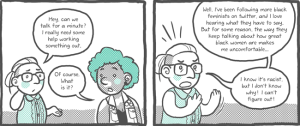
A person sitting on a couch, talking to a psychologist who is mostly out of frame.
When I first tried therapy six years ago, I had no idea how much planning and organization it would take to make it worth my time.
I showed up to sessions without any idea what I’d talk about, and usually ended up blurting out the first things that came to mind. (Contrary to psychoanalytic theory, that’s not necessarily the best way to get to the actual problem.)
I had no plan for applying anything I learned in therapy to the rest of my life – and no idea how to organize my time, both in sessions and outside of them, to make therapy as helpful as it can be.
Part of the issue was probably that none of the three therapists I saw seemed to push me at all, preferring to let me take the lead. Problem is, as a client, you don’t always know how to “do” therapy.
Now I’m a therapist myself, and I’m starting to understand just what a delicate and beautiful give-and-take therapy can be.
Yes, therapists can and should serve as guides to the process itself and help you get the most out of it. But there are definitely things you can do as a client to make sure that you benefit as much as possible.
If you haven’t yet, check out my first article about getting the most out of therapy. Here are five more things to try.
1. Take Notes Throughout the Week of Things to Discuss in Therapy
If you’ve been in therapy, you’ve probably had one of those weeks where so much went wrong that when you actually get to the therapy session, all fired up and ready to dissect the crap you’ve just been through, you suddenly find yourself drawing a total blank.
That’s not surprising – sometimes, the more you need to talk about, the harder it is to remember what any of those things actually are when you’re on the spot.
As a therapist, I’ve also been on the other side of this. A client comes in and says, “I had so many things I wanted to talk to you about! Really, I did! I just… don’t remember what.”
Taking notes about unpleasant things that you want to talk about in therapy may not sound like a lot of fun, but it can really help with this problem. It’s especially helpful if you have mood swings, memory problems, or difficulty opening up in therapy.
Folks with mood swings often find it difficult to “access” moods they’re not currently having, which makes it hard to talk about later.
Mental illness isn’t always considerate enough to have a flare-up right during your therapy session so you can process it with your therapist in the moment. Taking notes when relevant things happen can help you talk about it later, when you’re no longer feeling that way or when your memory would’ve otherwise faded.
For some people, taking notes is a difficult strategy to adopt because they don’t necessarily want to “dwell” on the negatives during the week, preferring to focus on the positives until they’re in the safe space of a therapy session.
But making a quick note like “tell therapist about crying and feeling really down on myself when my boss critiqued my work” isn’t the same thing as dwelling. It’s giving yourself the tools to work on it later.
2. Plan Ahead For Your Sessions
Once you’re taking notes during the week to prepare for your sessions, you’ve taken the first step towards being more intentional about how you use your limited time in therapy.
Since most of us have way more than a weekly hour’s worth of things to talk about, it can be helpful to think in advance about what you’d like to get out of each session and what you should prioritize talking about.
For instance, during a given week, you might take notes about your anxiety symptoms, a fight with your partner, and your concerns that you’ve chosen the wrong career. You probably can’t go very in-depth on any of these if you try to talk about all three in one session, so which one would be most helpful to talk about this week?
I really wish I’d known to do this when I was in therapy in college. At the time, my depression included lots of mood swings, but I was usually in a pretty decent mood when I actually went to therapy.
Since I had no plan, and my therapists were non-directive and rarely asked a question like “How has your depression been this past week,” I’d inevitably just start babbling on about whatever stressful exam or argument with a partner was currently on my mind without ever connecting anything to my overarching issues or goals for therapy.
Instead of talking about my depression, I usually talked about the ordinary little stressors and upsets that everyone experiences. I got exactly nowhere in therapy.
If I’d spent even a few minutes before my sessions to ask myself, “What do I want from this session,” I might’ve made a lot more progress.
3. Set Aside Time After Sessions to Do Some Self-Care
One of those things nobody tells you about therapy before you try it is that it doesn’t really feel good. Sure, sometimes it’s a relief to get something heavy off your chest; sometimes your therapist affirms you and helps you work through your self-blame or self-hatred, and you leave feeling so much better.
But much of the time, therapy is hard work. It makes you think about difficult things, even triggering things sometimes. It challenges your assumptions about yourself and about other people. After a session like that, you might feel like you’ve just had a strenuous workout, not an hour at the spa.
That’s why doing self-care right after a therapy session can be really important. It’s not necessary or possible for everyone, but if you feel depleted and raw after your sessions, it might be just what you need.
Remember that self-care doesn’t have to look like chocolate or bubble baths. I used to like going straight to work after therapy because it helped me get back into the swing of things and feel good about myself. Other people might prefer journaling, messaging a friend, taking a walk, working out, or any number of other restorative activities.
4. Don’t Just Vent
Many people think that therapy is venting about your problems while someone listens attentively and says “uh huh” and “hmm” and “that must’ve been stressful.”
This is usually part of what happens in therapy, and it can build rapport between you and the therapist – and sometimes it’s all you can do – but it’s not what therapy ultimately is.
Therapy is learning about yourself and your patterns and then learning how to change them. A skilled therapist will eventually start to show you the patterns in your venting: “I notice you’re often upset because you feel like the people in your life aren’t really listening to you” or “It seems like you feel like things ‘just happen’ to you without you having much control over them.”
Sometimes the therapist will be wrong about the patterns they perceive, but often they’ll be right even if you don’t initially think so. Follow these threads where they lead. It can be the key to creating a life where you don’t have to constantly rant about your stressful whatever or your disrespectful whoever.
5. Practice the Skills You Learn in Therapy in the Rest of Your Life
A therapist’s ultimate goal is to make themselves unnecessary. In order for that to happen, you have to take what you learn in therapy and apply it everywhere else.
This happens on two levels. One is the surface level: practicing the coping skills, communication strategies, and other practical knowledge outside of the therapy session.
The other takes place on a deeper level. In many types of therapy, the relationship between the client and the therapist is meant to serve as a model for other relationships (in certain ways). When you learn how to open up to your therapist, set boundaries with them, and trust that they won’t judge or reject you because of your flaws or because you disagreed with them, you’re also learning how to do that with other people.
Of course, it’s not easy – those other people probably aren’t getting paid to listen to you non-judgmentally. But the point is that just as your therapist accepts you for who you are, so can other people.
Once you’ve started to believe that about your therapist, practice placing that trust in other people. You can ask your therapist to help you find ways to practice all of these new skills if you’re not sure how.
***
If all of this sounds like a lot of work, you’re not exactly wrong. Therapy is work, and that can make it extra hard for the folks who need it the most.
Try to forgive yourself if you feel like you’re not putting as much effort into it as you “should” be – that’s why these are suggestions, not rules or instructions.
There may be times when you have to pull back from therapy and put a little less work into it as you deal with pressing issues going on in your life. During those times, let your therapist know what’s going on so they can do their best for you. Although I said that therapy’s not just venting, there may be times when that’s mostly what you’re doing – and that’s okay.
The better you care for yourself, the more mental resources you’ll restore to invest not just into therapy, but in everything else you value.
[do_widget id=’text-101′]
Miri Mogilevsky is a Contributing Writer for Everyday Feminism and a recently graduated with a Masters in Social Work and is starting a career as a counselor in Columbus, Ohio. She loves reading, writing, and learning about psychology, social justice, and sexuality, and is working on her cat photography skills. Miri writes a blog called Brute Reason, rants on Tumblr, and occasionally even tweets @sondosia.
Search our 3000+ articles!
Read our articles about:
Our online racial justice training
Used by hundreds of universities, non-profits, and businesses.
Click to learn more




















